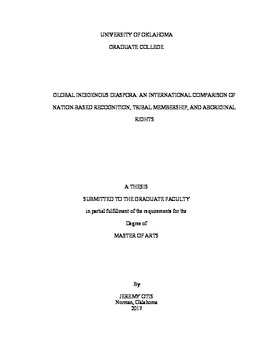| dc.contributor.advisor | Cobb-Greetham, Amanda | |
| dc.contributor.author | Otis, Jeremy | |
| dc.date.accessioned | 2017-12-06T17:15:16Z | |
| dc.date.available | 2017-12-06T17:15:16Z | |
| dc.date.issued | 2017-12-15 | |
| dc.identifier.uri | https://hdl.handle.net/11244/52726 | |
| dc.description.abstract | Nation-states often tell their Native populations who can and cannot be considered Indigenous. Two important tools of sovereignty are now, and have been for some time, Federal Recognition and Tribal Membership. Federal Recognition has taken various forms, depending on the Nation. No matter the country, however, Federal Recognition has a direct impact on Tribal Membership and individual perceptions of self. When one’s identity is legally denied by the federal government, it inspires a kind of cultural diaspora for Indigenous peoples across the globe. | en_US |
| dc.language | en_US | en_US |
| dc.subject | Native American Studies | en_US |
| dc.subject | Native American Law | en_US |
| dc.subject | Federal Recognition | en_US |
| dc.subject | Tribal Membership | en_US |
| dc.subject | Indigeneity | en_US |
| dc.subject | Native American Identity | en_US |
| dc.title | Global Indigenous Diaspora: An International Comparison of Nation-Based Recognition, Tribal Membership, and Aboriginal Rights | en_US |
| dc.contributor.committeeMember | Shotton, Heather | |
| dc.contributor.committeeMember | Robertson, Lindsay | |
| dc.date.manuscript | 2017 | |
| dc.thesis.degree | Master of Arts | en_US |
| ou.group | College of Arts and Sciences::Department of Native American Studies | en_US |
